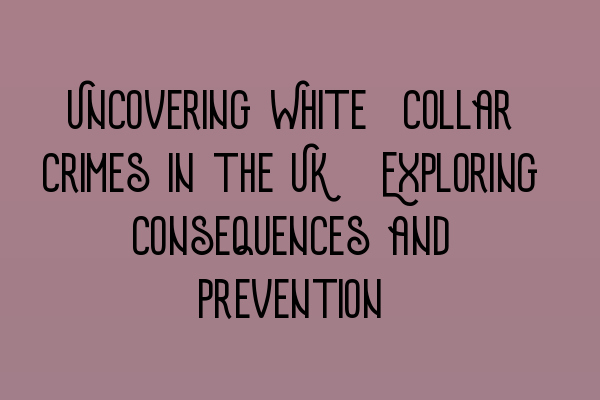Uncovering White-Collar Crimes in the UK: Exploring Consequences and Prevention
Welcome to the SQE Criminal Law & Practice Law UK blog, where we delve into various aspects of the UK legal system. In this post, we aim to shed light on white-collar crimes, their consequences, and strategies for prevention. White-collar crimes encompass a range of non-violent offenses typically committed by individuals or organizations for financial gain.
The Consequences of White-Collar Crimes
White-collar crimes can have far-reaching consequences, both for the individuals involved and for society as a whole. From embezzlement and fraud to insider trading and money laundering, these crimes erode trust, undermine financial stability, and can result in significant economic losses.
One notable consequence of white-collar crimes is the impact on innocent victims. These victims may include employees who lose their jobs, shareholders who suffer financial losses, or consumers who are deceived by fraudulent practices. It is crucial for the justice system to hold perpetrators accountable and seek restitution for those affected.
In addition to the immediate harm caused by white-collar crimes, they also have long-term implications. The erosion of public trust in financial institutions and corporate entities can have a lasting impact on our economy. It is essential to have robust regulatory measures in place to deter and detect white-collar crimes effectively.
Preventing White-Collar Crimes
Prevention is always better than cure when it comes to white-collar crimes. Here are some strategies to mitigate the risks:
- Implement strict internal controls: Companies should establish strong internal controls and regular audits to identify any irregularities or suspicious activities. By having clear policies and procedures in place, organizations can create a culture of compliance and integrity.
- Educate employees: Training programs that focus on ethics, compliance, and reporting suspected misconduct can help prevent white-collar crimes. Regular training sessions ensure that employees are aware of the legal and ethical implications of their actions.
- Strengthen whistleblower protection: Whistleblowers play a critical role in uncovering white-collar crimes. By providing legal protection and reporting mechanisms, individuals are more likely to come forward and expose illegal activities.
- Collaborate with law enforcement: Effective cooperation between private entities and law enforcement agencies is crucial in combating white-collar crimes. Sharing information and intelligence can lead to better investigations and successful prosecutions.
By implementing these preventive strategies, businesses and individuals can reduce the occurrence of white-collar crimes and protect themselves and society.
Conclusion
White-collar crimes pose significant challenges to the financial stability and trust within our society. They have serious consequences for victims and can cause long-lasting damage to our economy. However, by taking proactive measures and implementing preventive strategies, we can deter, detect, and prosecute these crimes effectively.
For more information on legal practice and preparation for the SQE exams, visit our related articles:
- SQE 1 Practice Exam Questions
- SQE 1 Practice Mocks FLK1 FLK2
- SQE 2 Preparation Courses
- SQE 1 Preparation Courses
- SRA SQE Exam Dates
